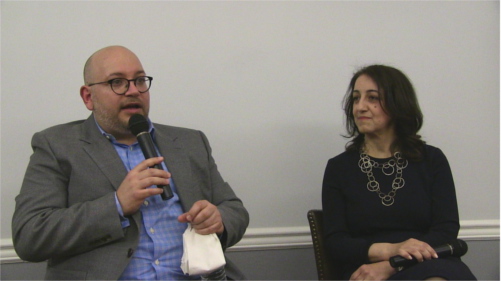Event Coverage Highlight

Jason Rezaian Says White House Lacks Clear Iran Policy
by Chad Bouchard
Jason Rezaian, a Washington Post reporter who spent almost two years in Tehran’s Evin prison, told attendees at an OPC book night that US-Iran relations are “in a bad spot,” and that there is an increasing likelihood something disastrous – but avoidable – could ignite between the two countries.
“If you look at the Trump administration, there is not a singular policy on Iran,” he said. “I think if you were to take a three-man poll of President Trump, his national security advisor, and his Secretary of State, each one would have a very different idea of what they think our Iran policy should be – and what it is. That scares the crap out of me.”
Moderating the chat was Farnaz Fassihi, senior writer at The Wall Street Journal. She is an Iranian-American journalist who grew up in Tehran and Portland, Oregon. The Iranian government spread rumors in 2010 that she had been shot, and an arrest warrant had been issued. She won the OPC’s Hal Boyle Award that year for her reporting on opposition protests.
She said after years of covering the Middle East, she still can’t be in a public space with headphones on. “I have to be hyper alert of every sound I hear and every conversation,” she said.
Fassihi asked Rezaian about his recovery from torture, solitary confinement, and 544 days of imprisonment.
He said he still suffers effects of PTSD, with sleeplessness and vivid nightmares of returning to his cell. He said it took a long time to adjust to life outside, getting car sickness because he’d lived so long “without horizons.” He remembered one of his first meals at a restaurant during a short vacation after his release.
“And they put a menu in front of me. And I had to make choices. And this was the first time I had the opportunity to make a choice for myself in a year and a half. And as much as I had longed for that moment, it wasn’t that easy.”
Fassihi asked about the possibility of prisoner exchanges with Iran. He said the country had recently signaled, in unusually strong terms, that that it would be open to prisoner exchanges.
“I worry that [the Trump] administration has been pretty successful bringing American citizens home from a variety of countries that we have tough relations with,” Rezaian said. “North Korea, Venezuela, Turkey – I wonder if it’s not politically expedient for this administration to have Americans languishing in Iranian prisons.”
Rezaian has released a new book about his ordeal, titled Prisoner: My 544 Days in an Iranian Prison–Solitary Confinement, a Sham Trial, High-Stakes Diplomacy, and the Extraordinary Efforts It Took to Get Me Out.
Related Events




